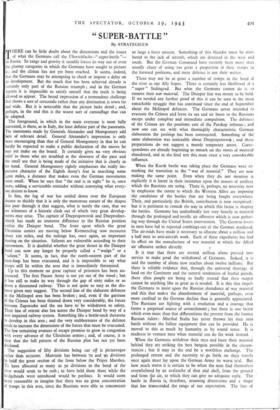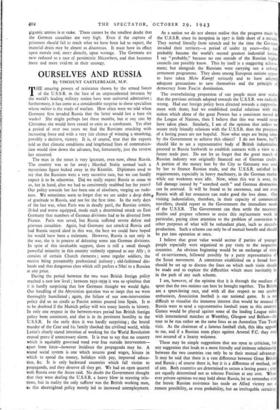" SUPER-BATTLE "
By STRATEGICUS
THERE can be little doubt about the dimensions and the issues of what the Germans call the Uberschlacht—" super-battle "- in Russia. In range and gravity it steadily forces its way out of even
the gloomy categories in which the Germans have sought to picture it; and the climax has not yet been reached. It seems, indeed, that the Germans may be attempting to check or impose a delay on its development. But the much that has been achieved already is certainly only part of the Russian triumph ; and in the German reports it is impossible to satisfy oneself that the truth is being allowed to appear. The broad impression of a tremendous challenge that shows a sort of crescendo rather than any diminution is sown far. and wide. But it is noticeable that the picture lacks detail ; and, perhaps, in the end this is the wisest sort of camouflage that can be adopted.
The foreground, in which in the main everyone is most fully interested, is there, as in Italy, the least definite part of the panorama.
The statements made by Generals Alexander and Montgomery add little of relevant detail. General Alexander's impression is only more encouraging than that of General Montgomery in that he can hardly be expected to make a public declaration of the moves he may yet make on the- board. It certainly gives no very obvious relief to those whd are troubled at the slowness of the pace and the small use that is being made of the initiative that is clearly in his hand. General Montgomery rightly emphasises the really im- pressive character of the Eighth Army's feat in marching some
3,000 miles, a distance that makes even the German movements seem small. When he says that " the end is in sight '•' he is, once more, adding a serviceable reminder without conveying what every- one desires to know.
In fine, the fog of war has settled down over the European theatre so thickly that it is only the monstrous nature of the shapes that peer through it that suggest, what is surely the case, that we
are witnesses of a historic clash out of which very great develop- ments may arise. The capture of Dnepropetrovsk and Dneprodzer-
zhinsk has made an immense difference to the Russian position within the Dnieper bend. The front upon which the great Ukrainian armies are moving below Kremenchug now measures
about 120 miles, and the mileage has, once again, an important
bearing on the situation. Salients are vulnerable according to their narrowness. It is doubtful whether the great thrust in the Dnieper bend can now any longer be properly called a " wedge " or a salient." It seems, in fact, that the north-eastern part of the river-loop has been evacuated, and it is impossible to say what troops still lie within the area that is immediately threatened.
Up to this moment no great capture of prisoners has been an- nounced. The first Panzer Army is not yet out of the wood ; but it has still to make its way through the gap of sixty miles or so down a threatened railway. This is not quite so easy as the dis- ance given may suggest. The second line of the elaborate defences in the Melitopol area has been broken ; and, even if the garrison of the Crimea has been thinned down very considerably, the forces between Zaporozhe and the sea have to be withdrawn to safety. Their line of retreat also lies across the Dnieper bend by way of a now impaired railway system. Something like a bottle-neck threatens to develop in this area ; and the very stubbornness of the defence tends to increase the dimensions of the forces that must be evacuated. The few remaining avenues of escape promise to grow in congestion with every advance of the Ukrainian armies ; and, of course, it is clear that the full pattern of the Russian plan has not yet been disclosed.
The suggestion of fifty divisions being cut of is picturesque rather than accurate. Manstein has between 70 and 90 divisions
to hold the great section of the front below the Pripet Marshes.
To have allocated as many as 5o divisions to the bend of the river would seem to be rash ; to have held them there while the bridgeheads were unreduced would be perilous. It would seem more reasonable to imagine that there was no great concentration of troops in this area, since the Russians were able to concentrate
so large a force unseen. Something of this blunder must be attri- buted to the lack of aircraft, which are detained in the west and south. But the German Command have recently been more than usually chary of using too great a proportion of their troops in the forward positions, and mere defence is not their metier.
There may not be as great a number of troops in the bend of the river as our Ally hopes. There is certainly less likelihood of a " super " Stalingrad. But what the Germans cannot do is to remove their war material. The Dnieper line was meant to be held. If we needed any further proof of this it can be seen in the most remarkable struggle that has continued since the end of September about the Melitopol defences. The Germans never intended to evacuate the Crimea and leave its sea and air bases to the Russians except under complete and immediate compulsion. The defences of the Crimea are the positions east of the Perekop isthmus ; and now one can see with what thoroughly characteristic German elaboration the position has been constructed. Something of the same elaboration was noticeable about Dnepropetrovsk ; and these preparations do not suggest a merely temporary arrest. Corre- spondents are already beginning to remark on the stores of material abandoned, and in the final test this must exert a very considerable influence.
When the Kursk battle was taking place the Germans were re- marking the transition to the " war of material." They are now making the same point. Even when they do not mention it explicitly it is latent in their insistence upon the masses of artillery which the Russians are using. There is, perhaps, no necessity now to emphasise the extent to which the Western Allies are imposing the conditions of the battles that are being fought everywhere. Their, and particularly the British, contribution is now recognised but it is pertinent to remark the way in which this factor is shaping the battles. Germany has undoubtedly lost very heavily in material through the prolonged and terrific air offensive which is now gather- ing way through the United States intervention. The German losses in men have led to repeated combings-out of the German manhood. The air-raids have made it necessary to allocate about a million and a half men to anti-aircraft work. Each of these expedients has had its effect on the manufacture of war material at which the Allied air offensive strikes directly.
It is true that there are several million aliens pressed into service to make good the withdrawal of Germans. Indeed, it is said the number of aliens now reaches about twelve millions. But there is reliable evidence that, through the universal shortage of food on the Continent and the natural tendencies of fearful guards, these alien people are being so badly treated that their output cannot be anything like as great as is needed. It is this that impels the Germans to insist upon the Russian abundance of war material and this that makes the abandonment of material, perhaps, even more cardinal to the German decline than is generally appreciated. The Russians are fighting with a resolution and a courage that forms a perpetual source of astonishment ; but there is one factor which even more than that differentiates the present from the former Russian rulers : Marshal Stalin has never thrown his men into battle without the fullest equipment that can be provided. He is moved to this as much by humanity as by sound sense. It is madness to venture men when material can do the work instead.
When the Germans withdraw their men and leave their material behind they are striking the best bargain possible in the circum- stances ; but it may in the end be a worthless exchange. The prolonged retreat and the necessity to go forth on their travels once again must lay upon the German Army its worst trial. But how much worse it is certain to be when the men find themselves overwhelmed by an avalanche of shot and shell, from the ground and from the air, to which they can give no adequate reply. The battle in Russia is, therefore, assuming dimensions and a shape that has transcended the range of our expectation. The fate of gigantic armies is at stake. There cannot be the smallest doubt that the German casualties are very high. Even if the capture of prisoners should fail to reach what we have been led to expect, the material drain may be almost as disastrous. It must have its effect upon morale and, more directly, upon wastage. The Germans are now reduced to a race of pessimistic Micawbers, and that becomes more and more evithnt in their strategy.



























 Previous page
Previous page